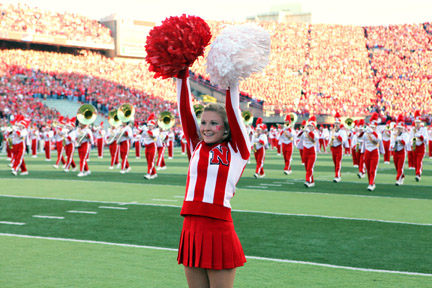
Cheerleading and psychology: two of Katrina Poppert's passions, came together in UCARE.
Poppert, a senior majoring in psychology and German from Lincoln, has been a cheerleader at UNL for four years. In her second-year research project for UCARE, she is studying the effects of varied amounts of media on cheerleaders' stress levels, with professor of psychology Daniel Leger working as her UCARE mentor.
Watch a video featuring Poppert's UCARE work at http://go.unl.edu/hzu.
The Undergraduate Creative Activities and Research Experiences program has undergraduates working directly with faculty members, participating in research and other creative activities on campus. The two-year projects give students the opportunity to add valuable experiences to their education.
Poppert's project is an extension of other projects led by Leger that studied hormonal responses in various campus populations. Previous research studied students taking tests or giving a speech, choral singers performing, and athletes like hockey players and baseball players during game time.
Physically demanding activities alone do not cause high amounts of stress, Leger's research has found. Components of evaluation or judgment, like speaking in front of one's peers, are associated with rising stress levels.
Poppert and Leger will measure the hormone cortisol, which is released by the body in response to the stress of being evaluated. Cortisol can be measured in saliva. They will take saliva samples at a practice and during two Husker football games: one with national television coverage and one with limited television coverage. They will take samples at three different times during each game: one hour before the game, at halftime, and when the game is over.
They predict cortisol levels will be the highest one hour before the game, but that they will level out by halftime.
Poppert will be cheering on the sidelines while taking samples.
She is working in three other psychology research labs, but said this project is more personal.
"It relates specifically to what I am doing and my interests," she said. "I love that I was able to specialize my project so much."
Leger said: "It was a very natural, logical kind of question for her to ask."
The ability to apply classroom learning to the real world has been a great experience, Poppert said.
"UCARE was my first research experience, and so through UCARE I learned that I enjoyed doing research," Poppert said. She plans to attend a clinical program to get a Ph.D. and the research experience will help her prepare for that.
"The future and the real world is not just reading out of textbooks, you have to be able to apply what you've learned," she said.
Poppert said Leger has guided her through the UCARE process and has helped her develop "the best study possible," she said. "(He's) helped me develop a path of things I wanted to research," she said.
Leger has seen Poppert grow academically in the three years they have known each other.
"I was very struck by her academic expertise," Leger said of first meeting Poppert. "But now she has, I think, a much more sophisticated understanding of what the research enterprise is all about," Leger said.
One of the less glamorous aspects of the research enterprise is obtaining the saliva samples.
"(People) are not always real eager to stop and spit for you," Leger said.
But the experience is still worthwhile.
"(It's) really opened some doors for me," Poppert said.
- Christine Scalora, Undergraduate Studies
More details at: http://go.unl.edu/hzu